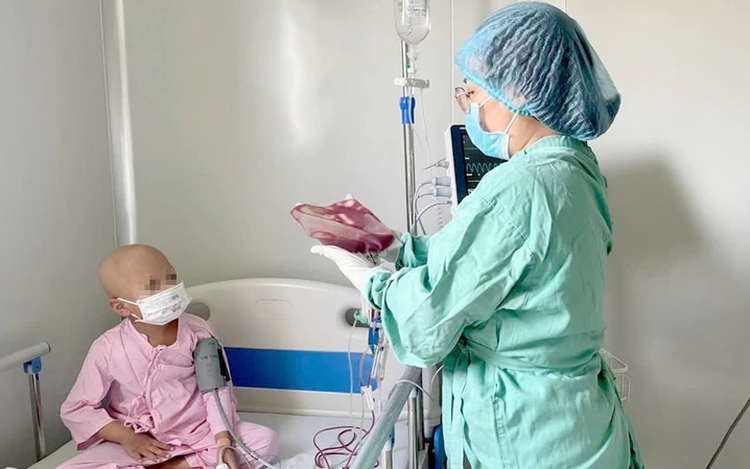
Doctors at Hue Central Hospital in central Vietnam have performed the country’s first allogeneic bone marrow transplant for a child with thalassemia, using stem cells from the child’s mother despite incompatible blood types. Photo: Thuong Hien
The hospital on Monday held a discharge ceremony for six-year-old Vu Quynh C. from Bac Ninh Province, northern Vietnam, marking her recovery from a groundbreaking transplant procedure supported by Italian doctors.
Diagnosed with beta thalassemia at just six months old, C. had required monthly blood transfusions.
At the age of three, she began iron chelation therapy because of signs of liver iron overload.
After learning that Hue Central Hospital had treated several thalassemia cases successfully through bone marrow transplantation, her family made the journey to Hue City in search of a cure.
Compatibility testing revealed an 11/12 HLA match between C. and her mother, making her a viable donor.
The transplant was conducted on August 11, following a carefully designed protocol developed in collaboration with Italian medical experts.
This case was considered highly complex, not only because the donor was the child’s mother but also because of the blood type mismatch: the child has blood type A, while her mother has type AB.
Rather than removing red blood cells from the donated marrow as traditionally done in such cases, the medical team applied a novel immune tolerance technique.
This approach involved gradually introducing the donor’s blood type into the recipient’s body, allowing for adaptation and minimizing immune rejection.
The method preserved valuable stem cells, reduced costs, and improved the overall success rate of the transplant.
During the post-transplant period, C. experienced several complications, including infections, bladder bleeding, and mild skin graft-versus-host disease.
However, with intensive monitoring, multidisciplinary care, and state-of-the-art equipment, her condition improved steadily.
On the 20th day after the transplant, her platelet count recovered, while her granulocyte levels stabilized on the 24th day.
On the 28th day, she was officially discharged, a milestone celebrated by her family and the hospital staff.
Vietnam reports some 2,000-2,500 new cases of severe thalassemia in children each year.
Most patients require lifelong blood transfusions and iron chelation therapy, leading to numerous complications and financial burdens.
Hue Central Hospital is one of the country’s leading centers for organ and stem cell transplantation.
Since 2019, it has performed 61 pediatric stem cell transplants, including 11 allogeneic procedures for children with thalassemia, all of whom are now transfusion-independent.
In August, the hospital expanded its transplant unit with two additional rooms, increasing its capacity to four simultaneous procedures.
Plans are also underway to implement haploidentical transplants for children lacking fully HLA-matched family donors, offering new hope to many more young patients battling this life-threatening genetic disorder.


Max: 1500 characters
There are no comments yet. Be the first to comment.